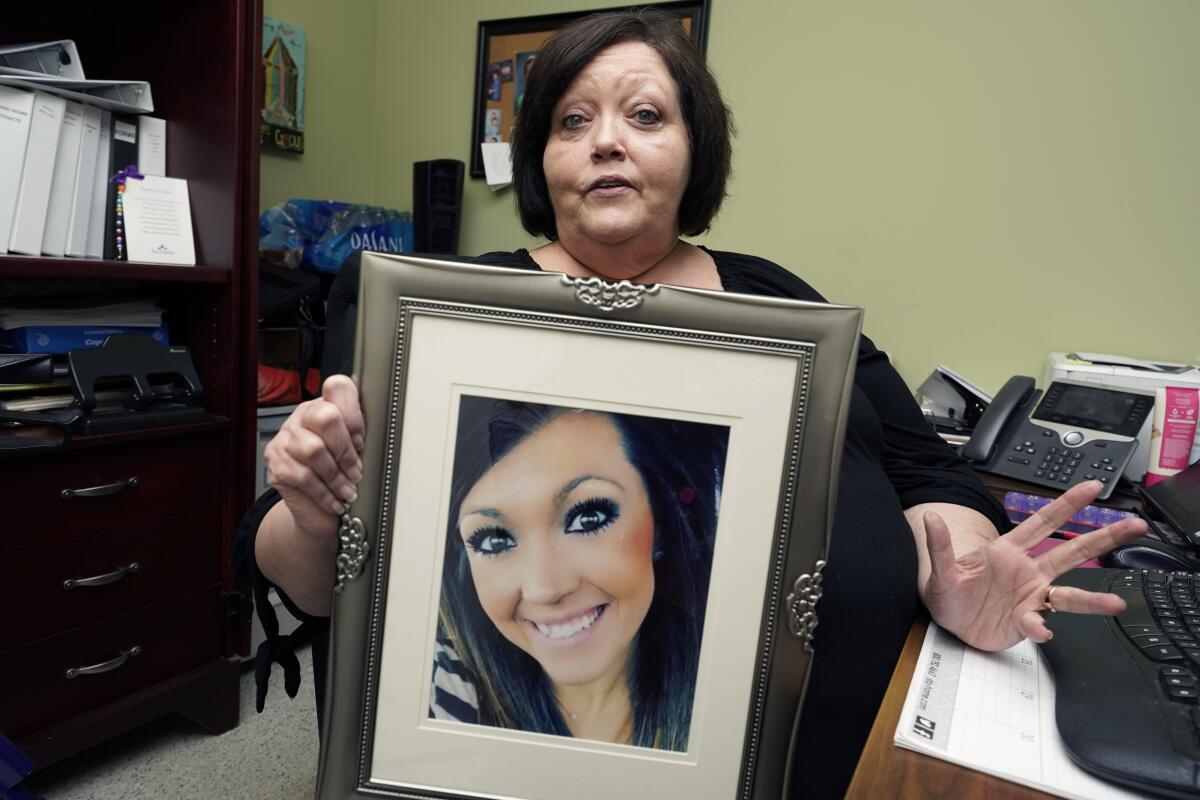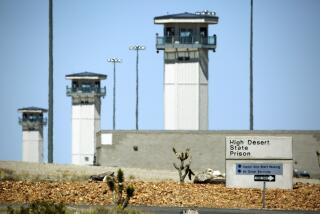Autopsy backlog plagues Mississippi, with worst delays in U.S.

- Share via
JACKSON, Miss. — After Truitt Pace admitted to law enforcement that he beat and shot his wife, her family expected a swift conviction. The 34-year-old mother of three’s tiny frame was so bruised and traumatized that the funeral home suggested a closed casket. But as months went by, prosecutors told Marsha Harbour’s family they were waiting on a key piece of evidence: the medical examiner’s autopsy report.
National standards recommend most autopsy reports be completed within 60 days. Prosecutors in Harbour’s case waited for a year.
Across Mississippi, many families wait even longer. An Associated Press analysis based on state data and documents, as well as dozens of interviews with officials and residents, found that Mississippi’s system has long operated in violation of national standards for death investigations, accruing a severe backlog of autopsies and reports.
Autopsies that should take days take weeks. Autopsy reports that should take months take a year or longer, as in Harbour’s case. Too few pathologists are doing too many autopsies. Some cases are transferred hundreds of miles to neighboring states for reports without their family’s knowledge.
The Mississippi State Medical Examiner’s Office was waiting for about 1,300 reports from as far back as 2011, records sent to AP in early April show. Around 800 of those involve homicides — meaning criminal cases are incomplete.
District attorneys have resigned themselves to long waits: “We’re at a point now where we’re happy if it’s only a year,” said Luke Williamson, who’s been a prosecutor for 14 years in northern Mississippi.
The National Assn. of Medical Examiners, the office that accredits U.S. death investigations offices, dictates that 90% of autopsy reports should be returned within 60 to 90 days.
Mississippi’s office has never been accredited. The majority of U.S. medical examiner agencies, underfunded and facing a shortage of forensic pathologists, are unaccredited. States such as Georgia have raised the alarm about report delays of up to six months. But nowhere is the issue more severe than in Mississippi.
Mississippi’s delays are an “emergency-level” concern, said Dr. James Gill, the association’s 2021 president. “That’s a disaster situation where you need to do something drastic.”
Public Safety Commissioner Sean Tindell is a former Mississippi Court of Appeals judge who stepped into his role in May 2020. He said eliminating backlogs is his top priority. Working as a judge, he saw trials delayed while prosecutors awaited reports.
“Families deserve better. I’m sorry that they’ve had to experience delays in laying to rest loved ones.”
Tindell said he’s instituted a policy that all reports must be back within 90 days. Using contractor pathologists in other states, the office began whittling down the backlog. Tindell said around 500 cases have been completed since summer.
But Tindell said it’s a challenge trying to fix old problems while facing new ones: the pandemic and increasing violent crime.
Mississippi saw 597 homicides in 2021 and 578 in 2020 — record numbers for the state of 3 million. That’s compared with 434 in 2019 and 382 in 2018.
Arkansas, with a similar population, had 347 homicides in 2021 and 386 in 2020.
From 2020 to April 2022, Arkansas employed five to seven pathologists performing autopsies. Mississippi employed two to three, as people left jobs.
Tindell said the forensics laboratory and medical examiner’s office haven’t been a state priority for funding or staffing in more than a decade. The forensic laboratory’s budget has essentially remained unchanged since 2008.
But during Mississippi’s 2022 legislative session, lawmakers approved $4 million that must be used to address backlogged cases.
Like most states, Mississippi does not perform an autopsy — a post-mortem surgical procedure by a forensic pathologist to determine cause of death — for all people. Autopsies are reserved for homicides, suicides, deaths of children and those in correctional facilities, and other unexpected cases. Forensic pathologists are responsible for performing autopsies at Mississippi’s two medical examiner offices — one in the Jackson metro area, one on the coast.
After the autopsy, pathologists complete a report explaining their findings and results, including an official cause of death. Reports can help determine whether a death was an accident, a suicide or a homicide. They shed light on child deaths, or show whether a person accused of murder acted in self-defense.
In the Harbour case, the autopsy report was the critical piece of evidence after Pace claimed self-defense for shooting his wife.
At the December 2021 trial where Pace was sentenced to life in prison, a medical examiner said Harbour suffered from blunt force trauma wounds consistent with being beaten before she was shot.
Harbour had endured months of abuse. She once went to a domestic violence shelter. But she worried for her children’s safety and never went to the police.
Because Pace had no criminal record, he was released on bond days after his arrest.
Harbour’s stepmother, Denise Spears, said she and her family felt dejected as they went to the mailbox month after month to find notices that the trial was being pushed back. Pace didn’t stand trial until more than three years after killing his wife.
One of the worst parts was explaining to her grandchildren why the man who killed their mother was able to live free for years, Spears said.
“It was hard for me to explain to them,” Spears said, “because I couldn’t understand it either.”
Tindell said problems won’t be fixed until the state is able to hire more pathologists. The National Medical Examiners Assn. standards recommend that pathologists perform no more than 250 autopsies a year.
In 2021, two Mississippi pathologists performed 461 and 421 autopsies. Arkansas’ six pathologists completed an average of 282 each.
To meet demand, the Mississippi Medical Examiner’s Office has been forced to send bodies to neighboring states like Arkansas. In 2021, 284 autopsies were completed by contractor pathologists.
The National Medical Examiners Assn. recommends autopsies be completed within 72 hours. Turnaround time in Mississippi has exceeded three weeks in some cases.
Clayton Cobler — coroner in Lauderdale County, where Harbour was killed — said families try calling the medical examiner’s office for answers about the status of autopsies and reports, and they often don’t hear back. Each of Mississippi’s 82 counties has an elected coroner responsible for collecting and transporting bodies to the medical examiner’s office. They end up acting as liaisons with families and answering desperate calls, Cobler said.
“More and more coroners or long-term coroners are saying, ’I’m done,’” said Cobler, who recently decided not to run for reelection. “It’s too heartbreaking.”
Leah Willingham is a corps member for the Associated Press/Report for America Statehouse News Initiative. Report for America is a nonprofit national service program that places journalists in local newsrooms to report on undercovered issues.
More to Read
Sign up for Essential California
The most important California stories and recommendations in your inbox every morning.
You may occasionally receive promotional content from the Los Angeles Times.










